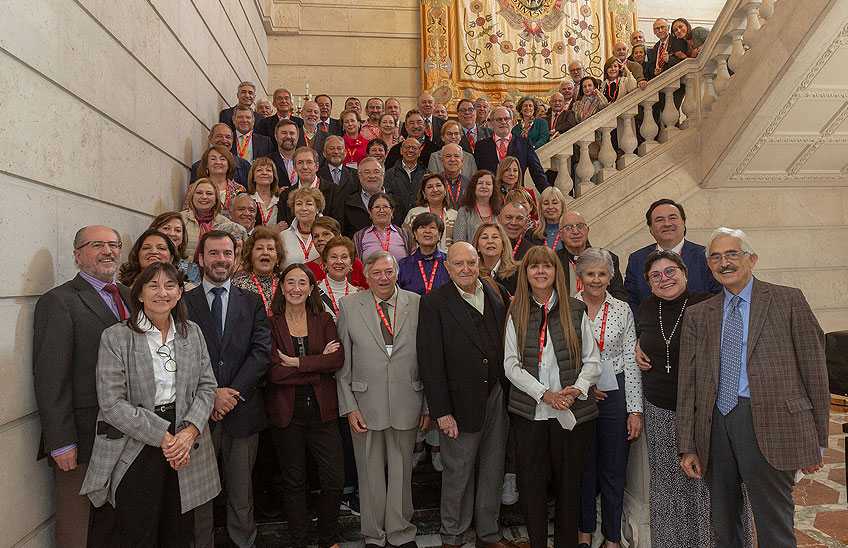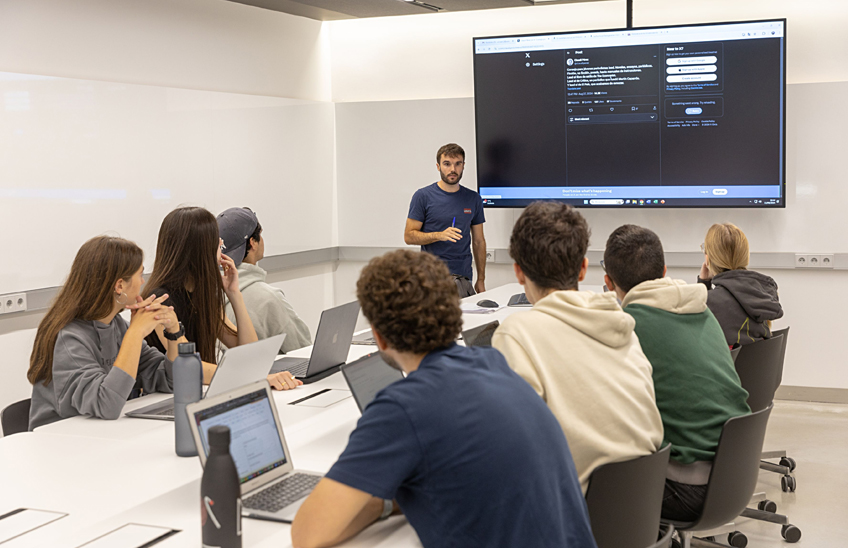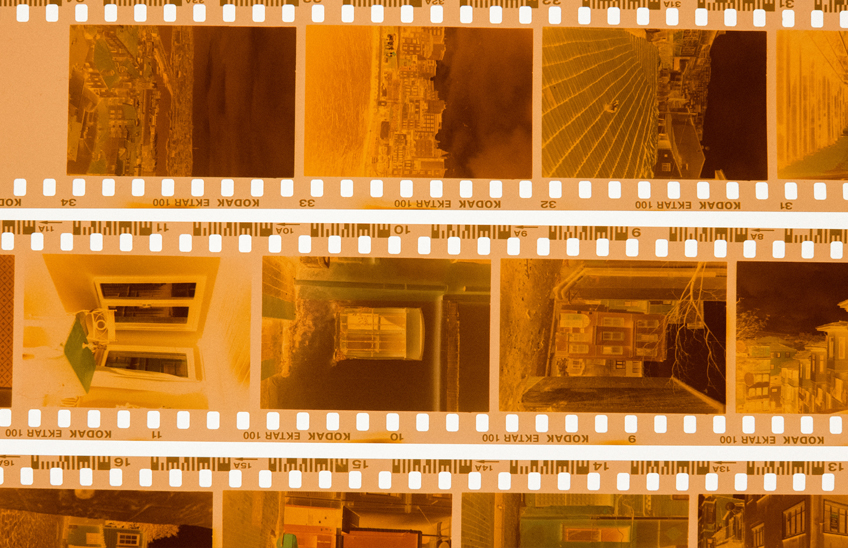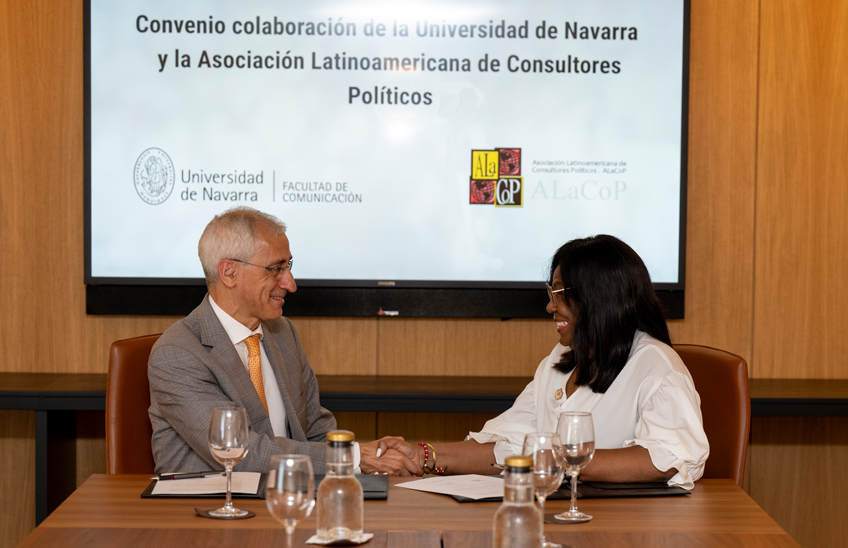Professor Carlos Alberto Di Franco: "Good information, regardless of the platform, requires talent, passion and rigor".
The 50th anniversary of the PGLA (Latin American Graduate Program) brought together at the University more than 70 alumni from 13 countries.

FotoManuelCastells/alumni of the PGLA with Dean Charo Sádaba and professors of the School of Communication of the University of Navarra.
14 | 10 | 2022
"Good information, regardless of the platform, requires talent, passion and rigor". This was stated by Carlos Alberto Di Franco, PhD in Communication from the University of Navarra and professor at the ISE Business School (Brazil), during the inaugural lecture on the occasion of the 50th anniversary of the PGLA (Latin American Graduate Program). The celebration brought together this week at the School of Communication of the University of Navarra more than 70 alumni from 13 countries of Central and South America, and more than twenty accompanying persons.
Under the degree scroll Journalism in times of digital disruption, Di Franco has advocated in his session to recover the identity of journalism, invest in the training and grade of professionals and in the quality of content. "Journalism is not a machine, it is not technology. The value of journalism is in high quality information, in talent, in judgment, in ethics, in innovation. Without public and independent journalism, the future of democracy is increasingly uncertain and worrying," he said.
According to Di Franco, society is undergoing a profound cultural change that journalism must face with a proactive attitude, looking ahead and discovering incredible opportunities. "The Internet, Facebook, Twitter and all the digital tools have changed politics and will change journalism, whether we want them to or not. We have to take a leading role in this change. Quality press is essential and all this depends on our courage to understand new contexts."
Carlos Alberto Di Franco has encouraged the recovery of journalism that smells of asphalt and feels the vibration of life. Face-to-face journalism, with soul. "The survival of traditional media requires a approach focused on the quality of the content. A journalism that monitors the public authorities and with a vocation of service. My conception of journalism is to discover stories worth telling and to present that story in a way that no blogger is capable of doing. Grit, elegance, rigor, ethics, talent, are the keys to conquer the new consumers", he concluded.
Prior to Carlos Alberto Di Franco's speech, Charo Sádaba, dean of the University of Navarra's Communication School , welcomed the attendees at the classroom Magna of Central Building. "Today we celebrate an eternal, infinite meeting that brought you to this University with the goal to go out into the world to change it," she said.
Sádaba described the PGLA as a program that in that year (1972) coincided fully with the development of the School of Communication. He had words of thanks first of all for the German bishops who, through the Aktion Adveniat Foundation of financial aid to development, promoted the program with the goal to strengthen the incipient democracies in Latin America. "The German bishops understood the importance of the role of journalists for societies to grow in freedom." Sádaba has also highlighted the international outreach of a program that was pioneering. "The PGLA pushed us to dream the world as the field of action of our work. The lives of all the PGLA students brought the world to Pamplona," he has pointed out and referred to the illusion of those teachers who worked for the program and gave their lives to make the School a meaningful place. He cited José Tallón, Francisco Gómez Antón, Carlos Soria, Ángel Faus, Pedro Lozano, Esteban López-Escobar, Alfonso Nieto and Luka Brajnovic.
alumni and professors of School of Communication had a special memory for the figure of the latter, in a simple tribute. "Don Luka was a journalist in essence and had fought to defend his professional integrity since his first steps in the profession," recalled his daughter and journalist, Olga Brajnovic.
"He could not be anywhere without working as such, without telling the truth of what was happening and publishing it at any cost. Even when his friends recommended him to take the easy way out, he answered, " I prefer to live hungry with a clear conscience than to eat every day betraying it, because that life is not worth living".
PGLA: an advanced training program for graduates from Latin America
The PGLA was an advanced training program for Latin American graduates who developed their work in the media in 13 countries of Central and South America. The program started on January 15, 1972 with 15 students and lasted 18 years. It was financed by the German foundation Aktion Adveniat from financial aid to development and organized by School de Comunicación.
The program was taught from January to June each year. During that time, participants attended classes, completed a work of research applied , learned about the main media and trends in the world's news world.
Professor Francisco Gómez Antón, who passed away in 2015, was the last director of the PGLA. In the 50th anniversary book of the School of Communication he wrote: "Most of those who take the program work today, spreading its spirit, in media in their countries of origin, or scattered across the wide world."



